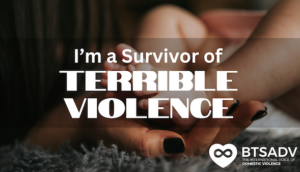When you think of the words happiness and joy, you most often think they are interchangeable and mean the same thing. While they do fall under the same umbrella in terms of emotions, they actually mean two different things, especially when it comes to domestic violence survivors.
Definitions
According to Merriam-Webster, happiness is defined as “a state of well-being and contentment.” The website defines joy as “the emotion evoked by well-being, success, or good fortune or by the prospect of possessing what one desires.”
By these definitions alone, you can conclude that happiness is an externally triggered emotion, while joy is internal. While both are emotions, happiness is typically affixed to something we experience and joy is an internal spark that is lit when we have a genuinely good feeling about our lives and are content with who we are and where we are in life.
Domestic violence aftermath
After experiencing domestic violence, survivors often find themselves in a state of emotional distress and tend to lose their joy. We may think we lose our happiness, but it is actually joy that we have lost.
The trauma that we endured stole our innocence and zest for life. The French call it “joie de vivre,” or joy of life. The internal joy that we felt was destroyed when the abusers chose to abuse us. We don’t really feel compelled to achieve what goals we had set out to accomplish because the abusers stole our enthusiasm and drive.
Why it’s harder to get your joy back
Because joy is an internal emotion, it is certainly more difficult to get it back after it is lost. But why is it more difficult? Why do we find it that much harder to get our “joie de vivre” back when we are domestic violence survivors?
The answer in that question lies within this one simple truth – prior to our domestic violence experiences, we have a child-like innocence about us. We have a certain naiveté about us that is pure and without corruption. We go through life thinking that everyone is kind, helpful and loving. We know is evil out there, but we don’t think that it could touch us.
But then, the evil does infiltrate our lives. The evil destroys the sweet innocence we once held. That innocence no longer seems obtainable. It’s like it’s lost forever.
That feeling that it’s lost forever is the reason why it’s much harder to get our joy back following a domestic violence situation. Feeling joy is internal and we may truly feel like the abusers obliterated our inner selves.
Getting your joy back
We might first think, “How do we get back that which was stolen from us?” We might think it’s an impossible task. But, there are ways to get your joy back. It’ll take time and effort, but it can be done.
In an article published on Tiny Buddha, joy is described as flowing “from the same source as love and peace; it flows from your heart” and it is “the light within.” It is described as the healing force that has the power to propel your journey in life forward.
So it stands to reason that we’d want to rekindle that inner light. Prior to our experience, we had a certain child-like innocence about us. That innocence was filled with inner joy! Children naturally possess a joy-filled life. They see the beauty, peace, and love everywhere around them. Just look for the joy within a child – it’s in the way they laugh, in the way they smile and the way they talk.
Below are some other ways to get your joy back:
- What about something you’ve always wanted to learn or try? Give that a go.
- Get creative (maybe try that Pinterest craft you’ve been eyeing).
- Read a book.
- Take a hike (literally! Go for a walk in nature).
- Get up and dance (put on some music to get you moving).
There are numerous ways to get your joy back. The above suggestions are just a few. Get creative and come up with your own ways to rekindle that spark within you.
If you or someone you know is in an abusive relationship, there is help. You can visit the Break the Silence Against Domestic Violence website at www.breakthesilencedv.org or chat with one of our helpline advocates at 855-287-1777.



